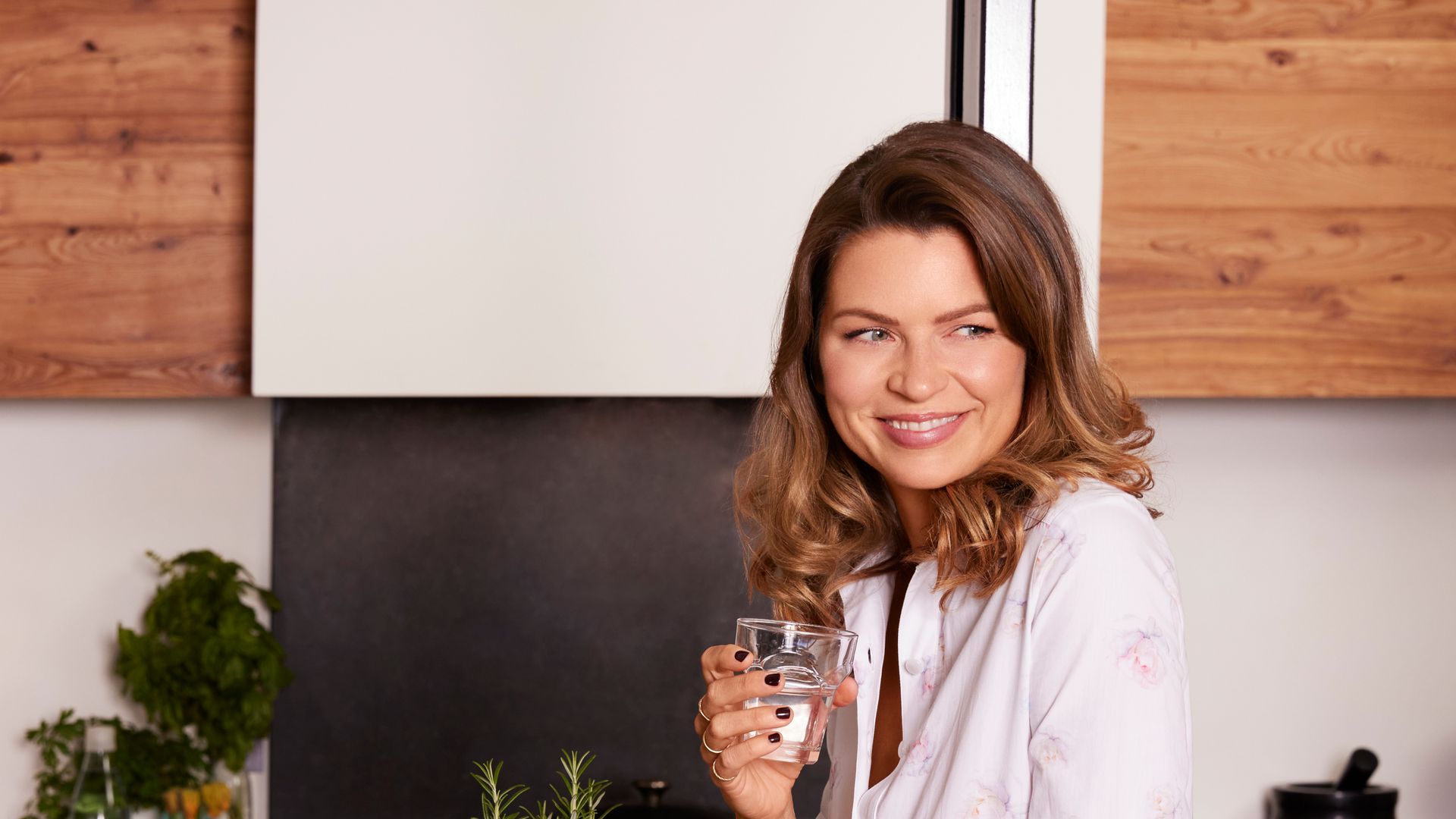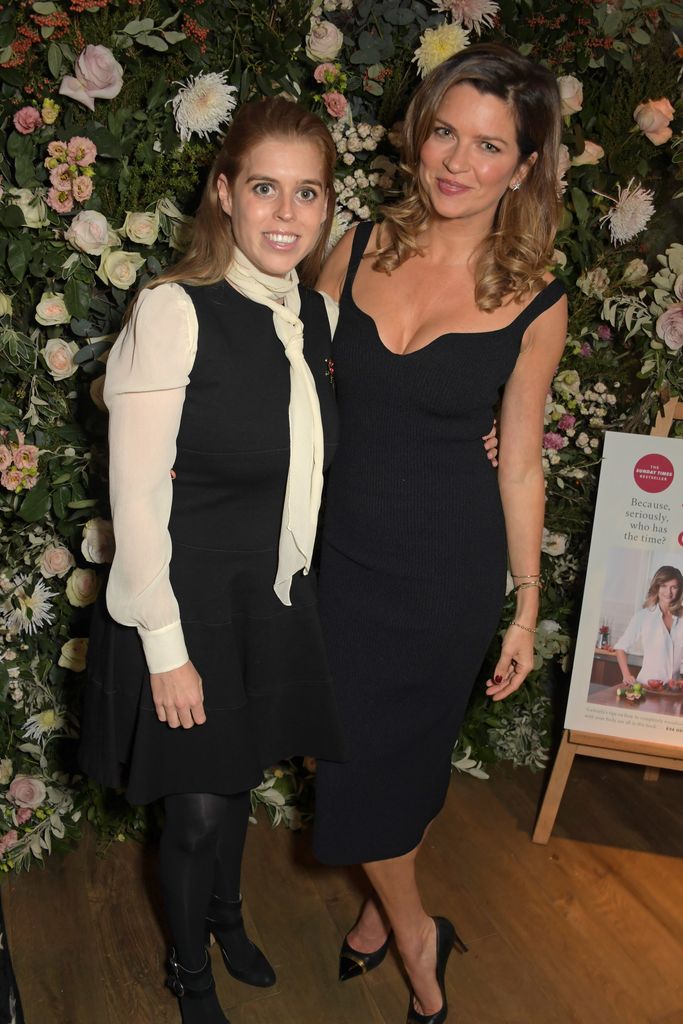When it comes to pregnancy, celebrity nutritional therapist, author and mum of three Gabriela Peacock tells HELLO! that "more than ever", you should eat more mindfully. "Focusing on your gut health is particularly important because the majority of our immunity – 70 to 80 per cent – lies within our intestines, so try to make sure that your digestive system works effectively," she says in an exclusive interview.
Gabriela, who counts Dame Joan Collins, Jodie Kidd and Princess Beatrice among her clients, shares her gut health advice for pregnant women and some energy-boosting meal ideas for those long, bleary days when baby arrives.
Gabriela, what foods should pregnant women eat to manage their gut health?
"Probiotic foods, such as natural live yoghurt, kefir, sauerkraut, miso and kimchi, will regulate how your digestion works, but also assist the break-down and absorption of foods, which is incredibly important during pregnancy. You are growing this new human being so you need all your nutrients: macronutrients, such as protein, fats and carbohydrates, and also the micronutrients – vitamins, minerals and essential fats."
Do you have any tips for morning sickness?
"With morning sickness, the most dangerous thing is dehydration. If it’s extreme sickness, you need to discuss it with your doctor.
"I was really sick with my kids, but ginger tends to help. Ginger tea is delicious – add a bit of honey if it’s too spicy. You can also get ginger sweets and some people suggest ginger biscuits. Nairn’s do delicious ginger biscuits made of oats.
"Also, try not to have an empty stomach; when you’re hungry, you feel more nauseous."
What are your thoughts on "eating for two"?
"I don’t think you need to eat for two, but it’s important to lean in to your cravings – as long as you balance them with a healthy meal composition. It’s common during pregnancy for women to eat a lot of carbs, but there are choices of carbohydrates. If you have pasta, have wholegrain, chickpea or pea pasta. And focus on eating protein with these carbohydrate cravings. Try switching the toppings, so if you don’t feel like chicken, try vegetarian sauces, tofu or bolognese.
"It’s important to be relaxed and enjoy this time, but be mindful that this is not an excuse to just eat Haribo and drink Fanta. It’s not going to be beneficial for you or for the baby."
Should women take supplements, before, during and after pregnancy?
"Absolutely. I do blood tests all the time and I’ve not found one patient who doesn’t have some kind of deficiency. Prenatal supplements and normal multivitamins are absolutely fine, but if you’re pregnant, you need to stop the prenatal multivitamins. Also, take folate and vitamin D, which is essential pre, during and post-pregnancy.
"Omega-3 is also really important. It’s anti- inflammatory and immunity-supporting for the mother, but also, most of a baby’s brain is made of fats and omega fats are the main ones. Aside from eating the sources of omega-3 – oily fish, nuts and seeds – I recommend omega-3 supplements to all my clients.
"If you have a digestive imbalance or your digestion wasn’t great pre-pregnancy, consider probiotics. I took probiotics throughout all my pregnancies because it regulates your digestion, but it also supports the immune system, which you want to build up to pass it on to the baby."
What healthy snacks can new parents eat to boost their energy?
"It’s easy on little sleep to crave carbohydrates, but sadly, once you start that vicious circle, it will continue during the day. It’s all about balance and moderation. If you think about energy, protein is your friend; carbohydrate is only your friend for about 20 minutes. For breakfast, if you have a piece of toast, have a yoghurt or an egg with it. If you have time, porridge with milk, but if you don’t, prepare some bircher muesli in the evening. I have a really nice overnight oats recipe in my book 2 Weeks to a Younger You.
"Lunch and dinner are a bit easier, but again, focus on protein, even if it’s sliced meat, smoked salmon or a piece of cheese. Quite frankly, you can have porridge for lunch! It really doesn’t matter, just eat something convenient that’s high in protein.
"If you’re on the go, try good quality protein bars. Always have a look at how much protein they contain: the higher the number, the better. If it’s called an energy bar, there’s too much sugar. Energy bars tend to be just full of dried fruit, which is fine, but in moderation."
What’' the most common question you get asked by pregnant clients?
"A lot of new mums are thinking about weight and getting back into shape, which is not something I encourage. The baby is the priority and if you’ve just been pregnant, you really need to relax and be kind to yourself. Don’t rush anything, don’t stress about stuff. Don’t judge yourself but be organised and have a loose plan in your head. It really helps."
Are there any adaptations that women who are breastfeeding need to make?
"Everything you do at this point goes directly into your baby’s digestion. Coffee is a stimulant that gets passed on to the baby, so the recommendation is one coffee per day. Have a weaker coffee, or perhaps two small filter ones per day. Or you can have a couple of green teas, which are amazing and extremely good for your immunity. I’m not going to tell anyone to stop drinking coffee, but be conscious that it will stimulate your baby. “There are some herbs which are known to interfere with your milk production, like parsley and coriander, but always discuss these things with your doctor. Cruciferous vegetables, like broccoli, Brussels sprouts and cauliflower, sometimes cause bloating for the baby. I wouldn’t say don’t eat them, because they’re some of the healthiest vegetables you could eat, but if your baby reacts to them, you might want to watch it."
2 Weeks to a Younger You: Secrets to Living Longer and Feeling Fantastic is out now (Kyle Books, £25). To find out more or to buy supplements, visit gpnutrition.com.
Subscribe to HELLO! to get the magazine delivered free to your door every week or purchase the digital edition online via our Apple or Google apps.











